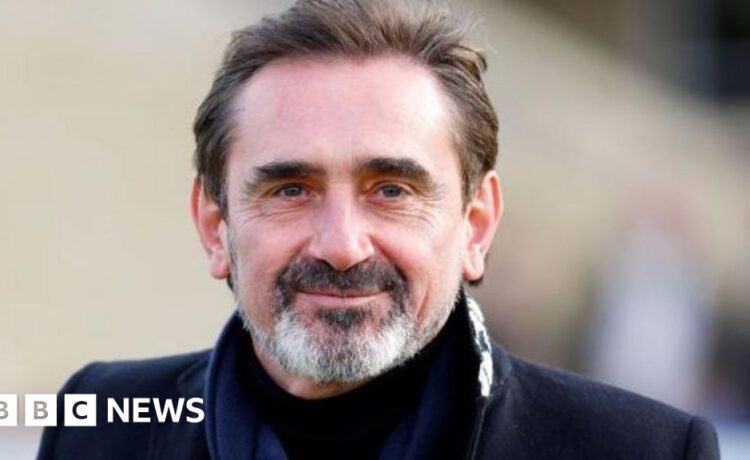Image source, Getty Images
- Author, Lora Jones
- Role, Business reporter, BBC News
The boss of Superdry has hit back at criticism the brand is “not as cool as it used to be”.
Julian Dunkerton’s response came as the company launched a huge restructuring programme aimed at securing the British retailer’s survival.
Mr Dunkerton told the BBC that the clothing brand was a “broad church” appealing to different types of shoppers.
However, on Tuesday the chain announced a range of cost-cutting measures, including delisting from the London Stock Exchange.
The fashion business, which runs 216 shops as well as franchised stores, has been looking at various ways to save money after a year of weakening sales and deepening losses.
Plans to cut costs include the firm looking at reducing rents on 39 of its UK shops, as well as raising money through a sale of new shares.
Superdry said it would be forced to enter into administration if it did not go ahead with the plans.
Mr Dunkerton, chief executive and co-founder, said the announcement marked a “critical moment” in the company’s history.
But in an interview with the BBC shortly after the announcement, he said he was “confident” the measures would see “the future of the brand is secured”.
Not as cool as it used to be?
The retailer, which started out as a market stall in Cheltenham in 2003, was set up by Mr Dunkerton and James Holder, and went on to enjoy huge commercial success.
Delisting from the London Stock Exchange will help Superdry save on cash and on Mr Dunkerton’s time, the firm said on Tuesday.
It added the move would also allow it to carry out its restructuring “away from the heightened exposure of public markets”, although the business will need shareholders to approve its restructure plans at its next general meeting.
It hopes to carry its proposals out by July 2024, according to a provisional timetable.
But Peter Williams, former chairman of Superdry, suggested on the BBC’s Today programme that the move was a reflection of a “brand that is probably not as cool as it used to be”.
“That’s the problem – because teenagers don’t necessarily want to shop where their parents used to shop and there is this natural culling of fashion brands that goes on,” he said.
Mr Dunkerton, who previously resigned from the board before returning to “steady the ship” in 2019, hit back, saying: “The reality is that the brand speaks to all human beings – it’s a very broad church and needs to be.
“While you go through the ebbs and flows of brand heat – actually having a diverse customer base is key,” he added, citing the success of sportswear giant Nike as an example.
Mr Dunkerton said it he would personally back the equity raise, and said this shows his commitment “to making sure we save jobs and this brand which is a great British success story.”
The 59-year-old is the company’s largest shareholder and said last month that he would not make an offer for the shares that he does not already own.
He acknowledged, however, that Superdry’s marketing could have been more “pinpointed” to younger shoppers it has been trying to draw in by partnering with influencers and stepping up its social media marketing on Instagram and TikTok.
While the High Street brand was once worn by celebrities such as Justin Bieber and David Beckham, it’s now favoured by older men looking for practical clothing, according to Alice Price, associate apparel analyst at research firm GlobalData.
She suggested the firm’s problems mainly lie with its struggle to keep up with the latest trends and prominent branding on some of its T-shirts and hoodies, which has fallen out of fashion.
Mr Dunkerton pointed out that it has different logo sizes added to different items, all “talking to different demographics”, while its 90s-style baggy jeans and cropped T-shirts were performing well with younger people.
The fashion brand, known for its coats and hoodies, has seen its share price fall from more than 500p to a little over 5p.
Superdry said it wanted to delist from the London markets so it could carry out the restructuring “away from the heightened exposure of public markets”.
As part of the turnaround plan, it will also extend the due date of large loans and wants to boost sales by improving its product ranges and reallocating marketing spend.
Despite spending on tie-ups with celebrities such as Brooklyn Beckham and football superstar Neymar Jr, in the six months to the end of October, sales across the group fell 23.5% to £220m as consumer spending was squeezed and shoppers may have been put off heavier clothing items due to “unseasonal” weather.
Many retailers have struggled with difficult conditions as household budgets and supply chains have come under pressure in the wake of the Covid pandemic and the cost-of-living crisis.
“The ailing fashion player need only look at the likes of Abercrombie and Hollister, which too struggled to shake off their outdated early 2010s aesthetic for many years but have since enjoyed a successful turnaround, having invested in refreshing their product assortment,” Ms Price added.
On Tuesday, boot-maker Dr Martens announced its current boss Kenny Wilson planned to step down as the company faces a “challenging” year ahead in the US in particular.
Its share price fell as much as 30% on Tuesday, hitting a record low and stepping up the challenge faced by successor Ije Nworokie.














